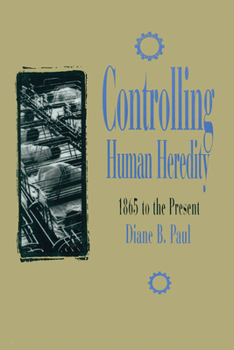Controlling Human Heredity: 1865 to the Present
Select Format
Select Condition 
Book Overview
In the late nineteenth and the early twentieth century, it was widely assumed that society ought to foster the breeding of those who possessed favorable traits and discourage the breeding of those who did not. Controlled human breeding, or "eugenics" as it was called, was a movement with broad support that lasted into the 1930s. In this concise historical account, the author answers the questions of why eugenics, the search for means to propagate only "good genes," was so attractive earlier in the twentieth century, why it then fell into disrepute, and whether it has returned today in the new guise of genetic counseling.
Format:Paperback
Language:English
ISBN:1573923435
ISBN13:9781573923439
Release Date:November 1995
Publisher:Humanities Press Intl
Length:170 Pages
Weight:0.60 lbs.
Dimensions:0.5" x 6.0" x 9.0"
Customer Reviews
1 rating
Great Introductory Survey of the History of Eugenics
Published by Thriftbooks.com User , 27 years ago
Diane Paul has produced a readable and brief introduction to the history of eugenic thought. After an excellent overview chapter, Paul proceeds chronologically from Francis Galton and social Darwinism through twentieth century campaigns for sterilization and immigration restriction in the name of eugenic reform. Paul convincingly argues that eugenics has been used by proponents of a variety of causes and political persuasions, left and right. With announcements every week of the discovery of the gene for some ailment, Paul's book is both timely and important. As the debates over cloning, genetic screening, or gene therapy continue, this book will provide a much needed historical context that can only help as we reflect on today's eugenics.





